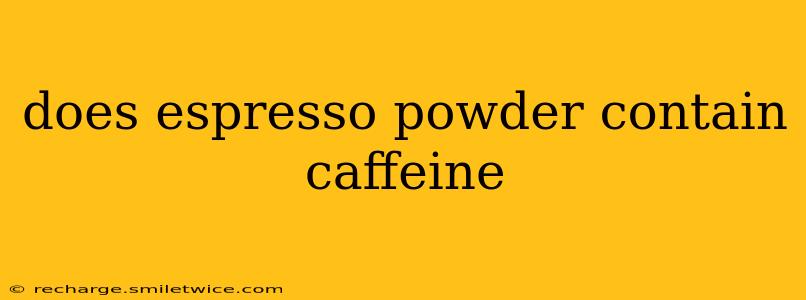Espresso powder, a concentrated form of instant coffee, is a popular ingredient in baking, cooking, and beverages. But a common question arises: does espresso powder contain caffeine? The short answer is yes, it does contain caffeine, though the amount varies depending on the brand and preparation method. Understanding the caffeine content and its implications is crucial for those sensitive to caffeine or seeking to manage their daily intake.
How Much Caffeine is in Espresso Powder?
The caffeine content in espresso powder isn't standardized across all brands. Unlike whole bean coffee where caffeine levels are relatively consistent per bean type and roast, the concentration process for espresso powder can affect the final caffeine levels. Generally, you can expect to find approximately 60-70mg of caffeine per teaspoon (about 2 grams) of espresso powder. However, always check the product label for the specific caffeine information provided by the manufacturer.
This is significantly less than a shot of espresso made from freshly ground beans, which typically contains 63-125mg of caffeine. The difference comes from the processing and the fact that espresso powder is often a blend of various coffee beans.
What Factors Affect Caffeine Content in Espresso Powder?
Several factors influence the caffeine concentration in your espresso powder:
- Brand: Different brands employ different roasting and processing techniques, resulting in variations in caffeine content.
- Roast Level: Darker roasts generally have slightly less caffeine than lighter roasts. While the roasting process doesn't eliminate caffeine entirely, it can cause some loss.
- Bean Type/Blend: The type of coffee beans used – Arabica or Robusta – significantly impacts the final caffeine levels, with Robusta beans naturally possessing much higher caffeine content.
- Processing Methods: The manufacturing process itself can influence caffeine retention.
Is Espresso Powder Caffeine-Free?
No, espresso powder is not caffeine-free. While the caffeine content is generally lower per serving compared to a shot of espresso, it still contains a notable amount of caffeine. Individuals sensitive to caffeine should be aware of this and adjust their consumption accordingly.
How Does Espresso Powder Compare to Instant Coffee?
While both espresso powder and instant coffee are convenient options, they differ in their caffeine content. Espresso powder is often slightly more concentrated in terms of flavor and caffeine. However, the exact caffeine level in both varies considerably depending on brand and specific product. Always check individual product labels for specific information.
What are the Effects of Caffeine from Espresso Powder?
The effects of caffeine from espresso powder are similar to those from other coffee sources, including increased alertness, improved focus, and a boost in energy. However, excessive caffeine intake can lead to side effects like anxiety, insomnia, jitters, and digestive issues. The amount of espresso powder consumed will determine the intensity of these effects.
Can I Use Espresso Powder if I'm Caffeine Sensitive?
If you're sensitive to caffeine, you should use espresso powder sparingly and monitor your reaction. Start with a very small amount to gauge your tolerance and avoid consuming it close to bedtime. Consider decaffeinated espresso powder alternatives if significant caffeine sensitivity is a concern.
How Can I Reduce Caffeine Intake from Espresso Powder?
To minimize your caffeine intake when using espresso powder:
- Use less powder: Reduce the amount used in recipes or beverages.
- Choose a decaf option: Many brands offer decaffeinated espresso powder.
- Mix it with other ingredients: Dilute the powder with other non-caffeinated ingredients.
By carefully considering the factors affecting caffeine levels and your personal sensitivity, you can enjoy the convenience and flavor of espresso powder while managing your caffeine intake effectively. Always remember to check product labels and listen to your body.
